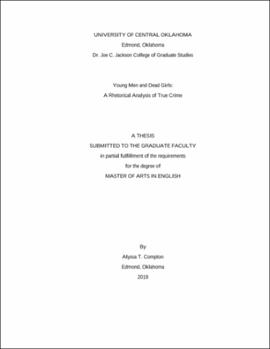| dc.contributor.advisor | Similly, Leslie | |
| dc.contributor.author | Compton, Alyssa T. | |
| dc.date.accessioned | 2020-07-09T14:41:02Z | |
| dc.date.available | 2020-07-09T14:41:02Z | |
| dc.date.issued | 2019 | |
| dc.identifier.other | (AlmaMMSId)9982665884002196 | |
| dc.identifier.uri | https://hdl.handle.net/11244/325106 | |
| dc.description.abstract | There are a startling number of shows in the 21st century that depend on the imagery of dead women as a component of storytelling. From shows that focus on serial killers to podcasts about men accused of murder, the image of the female corpse remains prominent and concerning. Though narrators, producers, and writers may be female, a patriarchal voice still dominates the discourse in most of true crime. True crime discourse has a long and complex history that transgresses national boundaries. Scholars have examined all facets of the discourse from its roots to its implications on American culture. True crime is not anything new in the world of entertainment and has a long history that contributes to its richness as a discourse. The focus of this research is to discover whether or not the presence of women in true crime denotes female control of language, or knowledge construction. This research uses both the actual media themselves, as well as responses garnered from internet research to analyze the discourse as a whole. I will discuss both true crime as a genre, which it is traditionally referred to as, and as a discourse. Michel Foucault is the primary theorist implemented in this research, with other scholars used to connect Foucault's concepts to true crime discourse. The results of this research revealed the genre depicts women's bodies as the consumable product that true crime sells frequently and in large quantities. The impending fear of death is an intense and undeniable fear that cannot be understated. While women consume true crime for different reasons, one of the most commonly discussed and substantial is based on the desire to learn to cope and protect oneself from future trauma. This research does not aim to state that these issues are new, only that they are relevant in this specific cultural moment. Those who are controlling the discourse are acting within a framework that emerged from years of patriarchal power structures framing language about gender and the phenomenon of violence. This type of media is not simply entertainment; true crime does inform the way society talks about and interacts with violence. This creates space for the discourse to eventually shift, and change the conversation about violence against women. The discourse has the potential to change, but only if the genre becomes aware of the larger social issues it reinforces. Future research could explore the potential of this growth and its impacts on the discourse. | |
| dc.rights | All rights reserved by the author, who has granted UCO Chambers Library the non-exclusive right to share this material in its online repositories. Contact UCO Chambers Library's Digital Initiatives Working Group at diwg@uco.edu for the permission policy on the use, reproduction or distribution of this material. | |
| dc.subject.lcsh | Women | |
| dc.subject.lcsh | Violence in popular culture | |
| dc.subject.lcsh | Podcasts | |
| dc.subject.lcsh | True crime stories | |
| dc.title | Young men and dead girls : a rhetroical analysis of true crime. | |
| dc.type | Academic theses | |
| dc.contributor.committeeMember | Rocha, Iliana | |
| dc.contributor.committeeMember | Bolf-Beliveau, Laura | |
| dc.thesis.degree | M.A., English | |
| dc.subject.keywords | Podcast | |
| dc.subject.keywords | Popular culture | |
| dc.subject.keywords | Serial killer | |
| dc.subject.keywords | True crime | |
| dc.subject.keywords | Violence | |
| dc.subject.keywords | Women | |
| dc.identifier.oclc | (OCoLC)1111685422 | |
| uco.group | UCO - Graduate Works and Theses::UCO - Theses | |
| thesis.degree.grantor | Jackson College of Graduate Studies. | |
